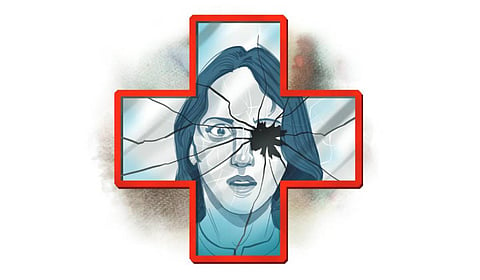

NEW DELHI: The centre on Tuesday said there is no proposal for establishment of a special tribunal for dealing with the cases of alleged medical negligence.
In a written reply in the Rajya Sabha, Minister of State of Health and Family Welfare Ministry, Anupriya Patel, however, said the Medical Council of India (Professional Conduct, Etiquette and Ethics) Regulations, 2002 stipulates that any complaint with regard to professional misconduct of a medical practitioner can be brought before the appropriate Medical Council for disciplinary action.
“If a medical practitioner is found to be guilty of such misconduct, the Medical Council of the concerned State/UT may award such punishment as deemed necessary or may direct removal of the name of the delinquent medical practitioner from the register altogether or for a specified period,” she said to a question from BJP leader, Dr Ajeet Madhavrao Gopchade, whether government is not contemplating the establishment of a special tribunal for the impartial and scientific resolution of alleged medical negligence cases in the interest of natural justice?
“Further, the Ethics and Medical Registration Board (EMRB) constituted under the National Medical Commission Act, 2019, exercises appellate jurisdiction on appeals filed by medical practitioners against actions of State Medical Councils,” the minister said.
To a question on the steps taken by the central government in collaboration with state governments to enhance oversight of treatment protocols in government hospitals ensuring that underprivileged individuals receive adequate and quality care, Patel said, ‘health’ being a state subject, it is the primary responsibility of the states/UTs to enhance oversight of treatment protocols in government hospitals for ensuring underprivileged individuals to receive adequate and quality healthcare.
On whether the government is aware of the increasing instances of alleged medical negligence in both government and private hospitals, the minister said, “The states/UTs are also responsible for taking cognizance of the instances of alleged medical negligence in both government and private hospitals as well as for taking appropriate measures to address the issue. The complaints regarding medical negligence, as and when received by the central government, are forwarded to the concerned State/ UT for taking necessary action.”
She, however, said the details of such cases are not maintained by the central government.
Patel said the government of India enacted the Clinical Establishments (Registration and Regulation) Act, 2010 (CE Act) and notified the Clinical Establishments (Central Government) Rules, 2012 (CE Rules) to provide for registration and regulation of government (except those of Armed Forces) as well as private clinical establishments belonging to recognized systems of medicine.
As per CE Act, the clinical establishments are required to fulfill the conditions of minimum standards of services provided for each type of service provided.
The CE Rules also mandate all clinical establishments to comply with Standard Treatment Guidelines (STGs) issued by the central/state government.
The states/UTs which have adopted the CE Act are primarily responsible for regulating their hospitals including private hospitals as per provisions of the CE Act and CE Rules to ensure the provision of affordable and quality healthcare to patients.
The CE Act also provides for cancellation of registration of hospitals, if the provisions of the Act are not complied with.
The clinical establishments in the states/UTs, which have not adopted and implemented the CE Act, are registered and regulated by the state Acts.
No information on online sales of high-risk prescription medicines
The Central Drugs Standard Control Organization (CDSCO) has no information regarding reported rise in online sales of high-risk prescription medicines, the centre informed the Rajya Sabha on Tuesday.
In a written reply, Minister of State of Health and Family Welfare Ministry, Anupriya Patel, said, “Central Drugs Standard Control Organization (CDSCO) has informed that there is no information regarding reported rise in online sales of high-risk prescription medicines.”
“In order to regulate the online sale of medicines comprehensively, the government had published draft Rules vide G.S.R. 817 (E) dated 28.08.2018 for amendment to the Drugs and Cosmetics Rules, 1945 for incorporating provisions relating to regulation of sale and distribution of drugs through e-pharmacy,” Patel said to a question from CPM leader, AA Rahim, whether the government has data on the rise in online sales of high-risk medicines without valid prescriptions.
She said the draft Rules contain provisions for registration of e-pharmacy, periodic inspection of e-pharmacy, procedure for distribution or sale of drugs through e-pharmacy, prohibition of advertisement of drugs through e-pharmacy, complaint redressal mechanism, monitoring of e-pharmacy, etc.